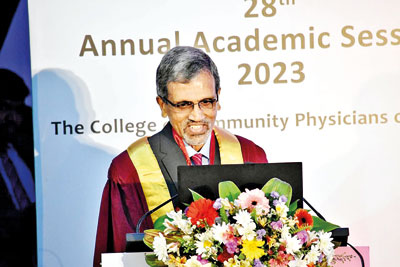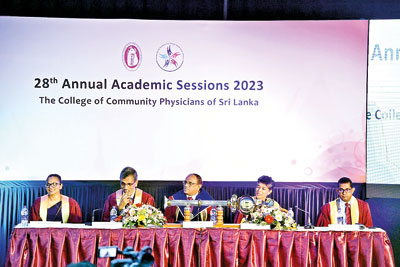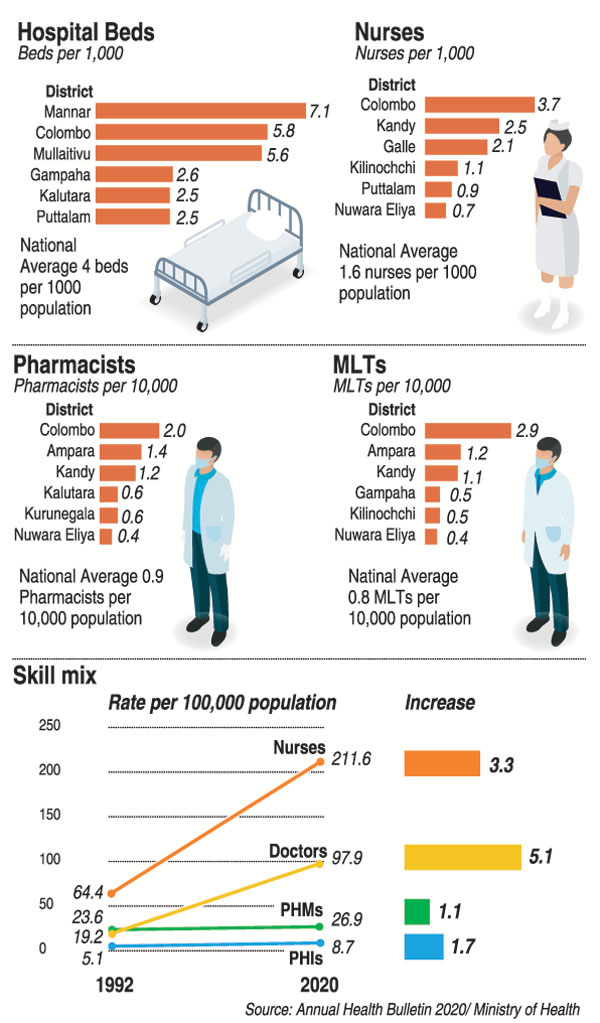News
The way to achieve health for all
View(s):- A public health expert says SL must agree on essential services for all without financial hardship, with experts seeking participation of a well-informed public
By Kumudini Hettiarachchi
This wide issue was what Prof. A. Pathmeswaran tackled under the theme – ‘UHC: From Rhetoric to Reality’. He was the Orator at the inauguration of the 28th Annual Academic Sessions 2023 of the College of Community Physicians of Sri Lanka (CCPSL) recently.

Prof. A. Pathmeswaran giving the oration
Pointing out that UHC covers the full continuum of essential health services, from health promotion to prevention, treatment, rehabilitation, and palliative care across the life course, he said that “we obviously have some way to go to reach UHC”.
The gaps include the extent of the population covered being less than 100% ; the cost met by the public being more than 0%; and the services covered being less than 100%.
“Theoretically, everyone is covered for all the services in Sri Lanka, but there could be a significant component of out-of-pocket expenses,” he said.
According to him our health indices such as Infant and Maternal Mortality Rates (IMR and MMR) and life expectancy at birth are good, even though there are some geographical variations. “We do not routinely collect or disseminate data on variations in health status by socio-economic status. Therefore, there is no way of knowing the extent of inequities. This is why we should be careful when interpreting numbers.”
Reiterating that the highest attainable standard of health is a fundamental right of every human being without distinction of race, religion, political belief, economic or social condition, this Emeritus Professor in Public Health of the Kelaniya University underscored that the state should ensure that the environment – social, economic and physical – is conducive and the people are empowered to ensure good health.
Next came the problems Sri Lanka is facing now – inadequate money for health; inadequate health for the available money; inadequate data; and maldistribution.

At the head-table (from left) are CCPSL Secretary Dr. Thushani Dabrera; Orator Prof. A. Pathmeswaran; CCPSL President Dr. S.M. Arnold; Chief Guest & former Assistant Governor of the Central Bank, Dr. Anila Dias Bandaranaike; and CCPSL Treasurer Dr. Athula Liyanapthirana
Prof. Pathmeswaran suggested the spending of the health budget more efficiently; the collection of appropriate and quality data and also their use to the maximum; and the right distribution of facilities – beds and manpower such as doctors, nurses etc., along with the right skill mix. It is possible to build and equip hospitals almost anywhere, but sending trained staff to difficult areas is not easy. (See graphic)
Referring to the ‘skill mix’ needed to give multidisciplinary care to people, he said that over the last 30 years there had been a remarkable increase (five-fold) in the number of doctors in the public sector, from 19 to 98 or to almost 1 doctor per 1000 population. The nursing cadre too has increased but not to this extent and the midwife-numbers remained unchanged probably as the number of births has not changed much. However, the increase in public health inspectors does not appear to be adequate.
Next he focused on some ‘impediments’ to innovation:
‘Prolonged incubation’ of projects such as the Primary Care System Strengthening Project (PSSP) 2018, which even after five years has deficiencies. They include –
Staffing – inadequate numbers in all categories other than doctors and nurses, but a majority of the latter groups also not receiving specific training.
Medicines – almost 40% of essential medicines not being available and lack of buffer stocks for many of the available ones.
Laboratory support – several basic tests not being available, lack of machines and inadequate staff.
Information System – Inadequate trained data entry operators and a web-based system with poor connectivity.
In ‘premature rollout’, he spoke of the strengthening of primary level care management of a non-communicable disease programme implemented as a pilot project in 2012. The nationwide introduction of Healthy Lifestyle Centres/Clinics took place without completing the assessment of the pilot project.
While Prof. Pathmeswaran touched on ‘vested interests’ which people could have as staff members, trade unions, pharmaceutical trade or other suppliers, smilingly he said he would not venture into the arena of ‘infighting’.
His suggestions for more health for the available money were: Reduce waste and improve quality, two sides of the same coin and introduce cost-effectiveness analysis for new interventions, new medicines and new procedures as well existing services which could be discontinued if not fitting the bill.
“To move forward, we must agree on the range of services or essential services that will be available to all without financial hardship,” said Prof. Pathmeswaran, adding that it is not something for experts to decide behind closed doors. It must be with the full participation of a well-informed public. This may sound idealistic but Sri Lanka should not always settle for what is practical but for what is right.

The best way to say that you found the home of your dreams is by finding it on Hitad.lk. We have listings for apartments for sale or rent in Sri Lanka, no matter what locale you're looking for! Whether you live in Colombo, Galle, Kandy, Matara, Jaffna and more - we've got them all!

